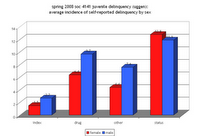as a wise sociologist told me in graduate school, “the people won’t tell ya a thing if yer sittin’ way over there in the non-smoking section.” these days, however, smoking is forbidden in public spaces throughout my home state of minnesota.
well, at least one clever smart alec is resisting the status politics of the smoking ban. mark benjamin noticed that the law carved out certain exceptions to the statewide prohibition:
“scientific study participants, native americans, tobacconists, truckers, farmers, actors and actresses and … wait! What was that last one? That’s right. When the smoking ban was debated, some theater-going, latte-drinking, Volvo-driving legislators got their undies all in a bundle that a few performers might not be allowed to smoke cigarettes on stage. Really. They worried that performers might have to suck on straws or pencils or — you know — “act” like they were smoking. Heavens! Whatever would become of The Theatre?”
spotting this loophole, mr. benjamin hatched a novel plan. he was so moved by the specter of heroic old regulars chased out of the state’s vfw’s and american legion halls that he suggested the following:
“if you’re a bar owner and don a beret, declare your bar a stage, hand out scripts and direct your patrons — ahem — performers to fire up some heaters, then you’ve got a bona fide “theatrical production” going on…Our shameless legislators favored the artistic integrity of a few theater owners over the blue-collar work ethic of a few thousand small bar owners. But our bar owners don’t have to take it any longer. If they want, they can put on their very own “Theater Nights,” set up “Acting” and “No Acting” sections, notify patrons that there will be some smoking during the performance and defy the government to define Art. It’s not the Freedom to Breathe Act; it’s the Freedom to Act Act. If you’re a small bar owner, hand out scripts and cigs and tell your patrons to break a leg.
mr. benjamin wasn’t just posing a hypothetical. last weekend, he organized an impromptu production of the tobacco monologues at a friendly bar called barnacles, somewhere in greater minnesota. there’s a video, of course, with a theatrically dressed mr. benjamin waxing poetic about the class politics of smoke-free bars.
though i’ve never smoked and i enjoy the fresh air in modern taverns, i’ve gotta confess that i’m rooting for this guy. of course, i’ll be rooting from the non-acting section.






 saturday’s
saturday’s 


